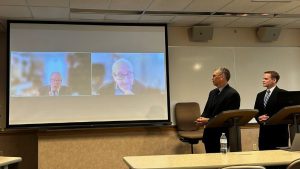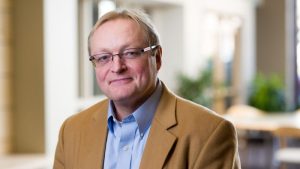
(L-R) Panelists Michael McCabe, Mark Cohen, and Will Covey with moderator Lucas Hjelle ’12
The second-annual Ken Port Memorial Lecture welcomed accomplished minds of the intellectual property world into conversation about trademark ethics in the U.S. and China, the two biggest players in IP globally. With over 100 attendees, the June 20 lecture was the largest CLE offered by Mitchell Hamline’s Intellectual Property Institute to date, and for good reason.
“This is a very timely lecture based on the issues I’m seeing,” said panelist Will Covey. Covey serves as deputy general counsel and director of the Office of Enrollment and Discipline (OED) at the United States Patent and Trademark Office (USPTO).
Covey was accompanied on the panel by Michael McCabe, who often represents defendants in front of the OED as managing partner at McCabe Ali, and Mark Cohen, author of the widely read China IPR blog whose career centers around the intersections of U.S. and Chinese law.
The past five years have seen the volume of fraudulent trademark applications, ethical cases, and regulatory action surge dramatically. Cohen, Covey, and McCabe brought their expertise and lived experience to the table when teasing out the causes—including economic incentives in China and regulatory changes in the U.S.—as well as international and ethical implications of this ongoing situation in trademark law.
Moderating the panel was Lucas Hjelle ’12, principal at Schwegman, Lundberg, and Woessner and someone with a special connection to the lecture series and its namesake, Ken Port.

Professor Ken Port
Port blazed a trail in trademark law, founded and served as longtime director of the IP Institute, and taught at Mitchell Hamline and its predecessor William Mitchell from 2001 until his passing in 2019. Hjelle was Port’s research assistant, frequent article co-author, mentee, and friend.
“This lecture series was created to honor his memory and extraordinary career, as well as keep his spirit alive in the next generation of legal minds,” said Hjelle.
Established in tandem with the lecture series was the Professor Ken Port Endowed Scholarship to Support Intellectual Property Students. Attendees were encouraged to contribute to the scholarship.
The IP Institute itself is another testament to Port’s legacy of scholarly dedication, innovation, and enthusiasm. The institute has long maintained a collaborative relationship with the USPTO, one that provides opportunities for their employees and Mitchell Hamline students alike.
Recently, Mitchell Hamline was the only school invited to hold a series of presentations for the USPTO, which educated employees about IP practice and policy, as well as promoted the school’s legal education. Many patent examiners, coming from an engineering background, lack law degrees. For these people, who are already working remotely, Mitchell Hamline’s blended-learning program is an ideal fit to help them obtain their J.D. from anywhere in the country.
“The USPTO is probably the most diverse place in the IP world, with many first-generation engineers and scientists, and that reflects our own diversity as a school,” added Professor Emeritus Jay Erstling.
The IP Law Clinic was also among the first in the country to be certified by the USPTO. Mitchell Hamline students are given temporary licenses to file and prosecute applications before the office, gaining real-world experience while part of the clinic. In addition, over eight Mitchell Hamline alumni have gone on to have careers at the USPTO.
This ongoing relationship and the successful second-annual Ken Port Memorial Lecture are only the beginning of what the institute strives to achieve under its new director, Professor R. Carl Moy. The well-known patent law expert has been teaching at Mitchell Hamline since 1991 and took on the director role at the start of the spring 2024 semester. Some of his big goals include continuing to develop innovative educational programming, expanding the IP student body and its diversity, and exploring non-J.D. programs.
Associate Director Deanna Burns affirmed, “We’re increasing our new and exciting offerings all the time.”
